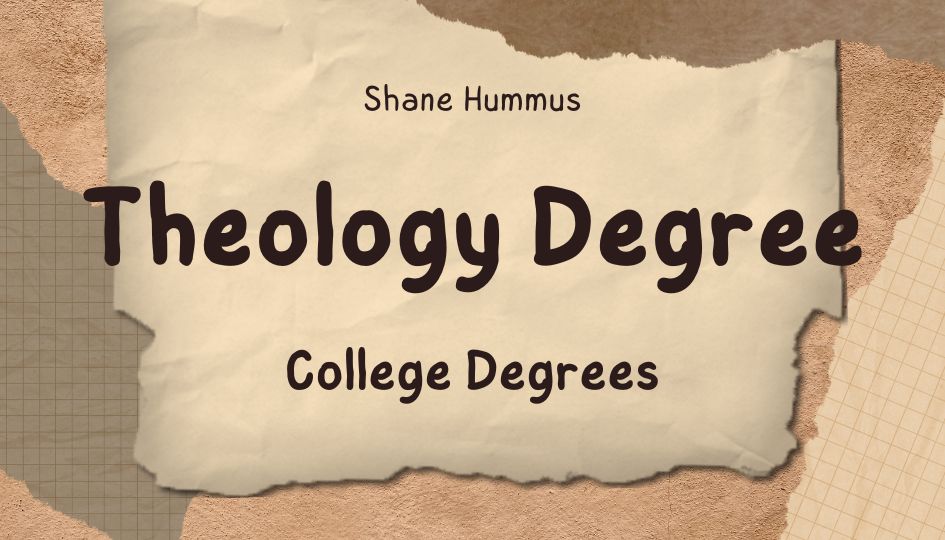Theology Degree: What are the Unseen Pitfalls?
In an era where STEM degrees are often held up as the gold standard of higher education, it’s easy for fields like the theology degree to get lost in the shuffle.
The study of theology, which delves into religious beliefs, practices, and experiences, has a rich history and remains a cornerstone of many liberal arts degrees. However, despite the inherent value of a theology degree, it is not without its drawbacks.
This article will shed light on these often-overlooked negatives, providing a comprehensive view for those considering this path. It’s crucial for prospective students to weigh the pros and cons to make an informed decision about their academic future.

What is a Theology degree?
A theology degree is an academic path that invites students to deeply explore the world’s diverse religious beliefs, practices, and traditions. The field of theology includes studying religious texts, doctrines, and dogmas, the historical development of religions, and the role of religion in society.
Theologians often grapple with profound questions related to ethics, the nature of the divine, and the impact of religious beliefs on human behavior.
This discipline is not confined to a single religious tradition. Depending on the program, students may have the opportunity to study Christianity, Islam, Judaism, Hinduism, Buddhism, and other religious traditions in depth.
It’s also worth noting that a theology degree doesn’t necessarily prepare students for religious service alone; graduates often find roles in academia, social services, non-profit management, counseling, journalism, and more.

Why Theology Degree Might Not Be Worth It
Limited Job Prospects
Although theology graduates have a wide array of potential career paths to consider, it is possible to recognize that these job opportunities might not be as abundant or easily accessible, especially when seeking well-paid roles. Those interested in entering religious service may encounter times when positions aren’t consistently available, or the compensation may not suffice to balance their education costs.
Cost of Education
The financial investment needed for a theology degree, like many college degrees, can be significant. If the education is financed through loans, the student may graduate with a substantial debt burden that could take years to pay off.
Lack of Practical Skills
Some critics argue that a theology degree does not offer the same level of practical and vocational skills as other fields of study. While graduates may be well-versed in religious texts and doctrines, they may lack the practical skills needed for jobs outside of religious institutions.
Narrow Specialization
A theology degree tends to be highly specialized, focusing on religious studies and doctrines. While this could be advantageous for certain career paths, it might limit opportunities in a broad array of non-religious sectors.
Decline in Religious Affiliation
The rise in secularism and the decline in religious affiliation in some societies could negatively impact the demand for professionals in theology.
Changing Cultural Attitudes
Society’s changing views on religion can lead to uncertainty in this field. In some areas, religious professionals may face opposition or a lack of support, making the job more challenging.
Low Pay
Many jobs within the field of theology, especially pastoral roles, are known for being fulfilling but not particularly lucrative. It’s important to consider whether the potential lower salary can offset the cost of education.
Lack of Industry Demand
In comparison to degrees like business, computer science, or healthcare, the demand for theology degrees in the industry may not be as high. Therefore, graduates could find themselves in a competitive job market with fewer opportunities.
These potential drawbacks do not necessarily make a theology degree a poor choice for everyone. Many people find great fulfillment and success on this path. However, it’s essential to enter this field with open eyes, understanding both the advantages and disadvantages of a theology degree.

Career Paths for Theology Graduates
Priest
This is a key role within many religious communities, providing spiritual guidance, overseeing various religious functions, and playing a crucial part in the organization of church affairs. Becoming a priest often requires additional post-graduate theological training or seminary.
Teacher
With a theology degree, you can impart your knowledge to others as a teacher. You could teach religious studies or related subjects at various levels, from high school to university, helping shape future generations’ understanding of religion.
Director of Religious Education
This role is pivotal in shaping the religious education curriculum within a church, school, or other religious institution. As a director, you would design and oversee religious education programs, creating enriching experiences for learners.
Youth Minister
As a youth minister, you would engage directly with young people within a religious context. This could involve organizing religious events, leading youth groups, providing pastoral care, and offering spiritual guidance to younger members of a community.
Missionary
Whether domestically or internationally, missionaries commit to spreading their religious beliefs, often in areas of need. This can involve social service, community building, and educational work, often in challenging contexts.
Seminary Professor
If you’re passionate about higher education and research, a position as a seminary professor could be an excellent fit. You’d get to teach future religious leaders, conduct research, and contribute to the academic field of theology.
Social Worker
The empathetic and ethical understanding nurtured by a theology degree can be well utilized in social work. This role involves providing support to individuals, families, and communities in need, often navigating complex societal challenges.
Pastoral Care
Pastoral caregivers offer essential spiritual and emotional support to individuals in hospitals, nursing homes, the military, prisons, and more. This role often involves working with people in challenging situations, offering comfort and guidance.
Publisher
There are many opportunities within publishing for theology graduates, such as editing or writing for religious publications, translating religious texts, or managing publication processes. This allows you to merge your interests in theology and literature.
Campus Minister
Campus ministers provide a vital spiritual presence in a college or university setting. This role can involve everything from organizing religious events and services to providing personal pastoral care and guidance to students.
Job Outlook/Demand After Completing Theology Degree
Score: 4.5/10
The job outlook for theology graduates may vary depending on their chosen career path. While theology studies equip students with a range of skills applicable to numerous fields, the job market is diverse and can sometimes be challenging to navigate.
Some of these are in the fields of postsecondary teachers, secondary teachers, managers, clergy, education administrators, directors of religious sectors, and even heavy truck drivers! These theology professions are expected to grow by 4–12% up until the year 2031, according to BLS.

Average Salary of Theology Degree Graduates
Score: 4/10
As of June 29, 2023, the median hourly wage for a theology job in the United States stood at $25.42.
According to data from ZipRecruiter, the hourly wages for this field are broad, stretching from as low as $10.82 to as high as $39.90. The majority of theology jobs, however, offer wages within the range of $19.95 (at the 25th percentile) to $30.05 (at the 75th percentile) across the country.
This wide pay range, with a difference of as much as $10.10, implies that there could be plenty of prospects for professional development and wage growth, contingent on factors such as expertise, geographical location, and professional experience.

We’ve pinpointed 10 cities where the standard salary for a Theology job surpasses the country’s average. Leading the pack is Santa Clara, CA, followed closely by San Francisco, CA, and Washington, DC, in second and third places, respectively.
Washington, DC, outperforms the national average by $10,937, a significant increase of 20.7%, while Santa Clara, CA, continues this upward trend, offering an additional $12,164, or 23.0% more than the national average of $52,870.

Job Satisfaction of Theology Degree Graduates
Score: 9/10
The job satisfaction level for theology graduates, as represented by a score, stands at 2.7 out of 5. But if we consider additional factors such as how graduates found theology degrees interesting and how they found the degrees intellectually fulfilling, we can see a score of 4.5 out of 5 for both factors.


Real-World Examples: What’s Going on with the Theology World?
Church Got Exposed for its Corruption
“You don’t get rich writing science fiction. If you want to get rich, you start a religion.” – @TheVulcanDeathGrip
American Christianity and What it is Doing to the United States
“It’s such a bizarre way to live. Spending your entire life pretending to be something you’re not, something you’re not even trying to live up to, to impress everyone around you…” – @Loostreaks
Graduated with a Degree in Theology, but no Experience and Currently Unemployed
“Do some volunteer or charity work. seriously. Even if it is just working in your local charity shop for a few hours a week…” @Variola13
Pros and Cons of Theology Degree
Every degree comes with its own unique set of advantages and disadvantages, and a theology degree is no exception. Let’s explore both sides to provide a more comprehensive perspective.
Pros
- Deep Understanding of Religions: A Theology degree offers a profound understanding of different religious beliefs, practices, and traditions, equipping students with a broad perspective on world cultures.
- Critical Thinking Skills: The study of theology often involves dissecting complex texts and philosophical ideas, which can enhance critical thinking and analytical skills.
- Ethical Insight: Theology can provide a rich foundation in ethics and morality, which is useful in many professional and personal contexts.
- Interpersonal Skills: Many careers in theology, such as pastoral care or youth ministry, involve working closely with people and require strong interpersonal skills.
- Versatile Career Opportunities: Theology graduates can find roles in a variety of sectors, from education and social work to publishing and nonprofit management.
Cons
- Limited Job Prospects: The job market can be challenging for theology graduates, as roles in this field can be limited and competitive, especially for high-paying positions.
- Cost of Education: As with many college degrees, the cost of a theology degree can be substantial, potentially leading to significant student debt.
- Lack of Practical Skills: Critics argue that theology degrees do not provide the practical skills that are often sought after in non-religious job markets.
- Narrow Specialization: Theology is a highly specialized field of study, which may limit opportunities in non-religious sectors.
- Decline in Religious Affiliation: With increasing secularism and decreasing religious affiliation in many societies, the demand for professionals in theology may continue to decline.
- Low Pay: Many roles within the field of theology are not particularly high-paying, which can make it challenging to manage student debt or achieve certain financial goals.
As with any significant decision, prospective students should weigh these pros and cons carefully before choosing to pursue a theology degree. It’s important to align your educational choices with your long-term career goals and personal circumstances.
If you’re looking for some of the most useless degrees, you can watch my video here:
Final Verdict for the Theology Degree
Salary | Score: 4/10
Please don’t get fooled by theology graduates you see on social media with big mansions, luxurious cars, and private jets. We can’t say if it came from their salary, supporters’ donations, old money, inheritance, benefits, etc.
One thing is for sure: the real-time data provided above has a low result of nearly $25 per hour. That’s why I’m giving it a score of 4 out of 10.
Satisfaction | Score: 9/10
With the satisfaction part, I guess people who pursue a degree in theology want to offer their services to the public, church, and alike, regardless of what location they are destined to, the compensation they are getting, etc. So, I’m giving it a solid 9 out of 10.
Demand | Score: 4.5/10
I’ll be honest with this one. With our society evolving daily and technology helping shape our future, theology workers are no longer a priority. Does having a theology degree help contribute to building modern infrastructure? Design a machine for factories? Invent medicines for curing cancer? I believe the answer is NO, unless they have a degree in engineering or medicine. That said, I’ll give this one a score of 4.5 out of 10.
X-Factor | Score: 4.5/10Their training instills deep critical thinking skills that enable them to analyze and interpret complex philosophical and societal issues. They gain profound insights into ethical and moral dilemmas developed through exploring various religious and spiritual traditions. I believe these skills are less relevant to our evolving society. Because of that, I’ll give it a score of 4.5 out of 10.
Overall Score: 5.5/10
Even if theology graduates are satisfied with their job outlooks, the compensation and demands are declining each day. Imagine this, after 50 years, when our world becomes more high-tech than ever, do you think people would still pursue a career in theology? Well, you have all the time in the world to think about it. But for now, I’ll give it a score of 5.5 out of 10.
If you want to know more about the best theology degrees, you can check out this video:
Frequently Asked Questions about Theology Degree
How long does it take to earn a Theology degree?
Typically, a Bachelor’s degree in Theology takes around four years of full-time study. A Master’s degree usually requires an additional two to three years, while a Doctorate can take up to four or five years beyond the Master’s level.
Can a Theology degree lead to a high-paying job?
While some career paths available to theology graduates, such as university professors or non-profit directors, can be well-compensated, many roles in this field are not particularly high-paying.
Is a Theology degree only for those who want to become priests or ministers?
No, a Theology degree can lead to a variety of career paths. While religious leadership is one option, graduates may also work in education, social work, non-profit management, counseling, publishing, and more.
Can a Theology degree be completed online?
Yes, many institutions offer online Theology degree programs. These can be a flexible option for those who need to balance their studies with work or other commitments.
Are there prerequisites for a Theology degree?
While prerequisites can vary between institutions, generally you will need a high school diploma or equivalent to pursue a Bachelor’s degree in Theology. For advanced degrees, a related Bachelor’s degree or substantial relevant coursework is usually required.
Is Theology the same as Religious Studies?
While they overlap, Theology and Religious Studies are different fields. Theology is often confessional, based on a specific religious tradition and exploring questions of faith and belief from within that tradition. Religious Studies, on the other hand, is typically comparative and analytical, studying religion as a cultural and social phenomenon.
Alternatives to Theology Degree
Theology degrees provide advanced study of religious texts, history, and practices. However, there are several alternatives for those interested in religion and spirituality without pursuing a full theology degree.
- Philosphy Degree
- Practical Theology
- Systematic Theology
- Biblical Theology
- Self-Guided Learning
- Seminary Certificate Programs
- Chaplaincy Certificate
